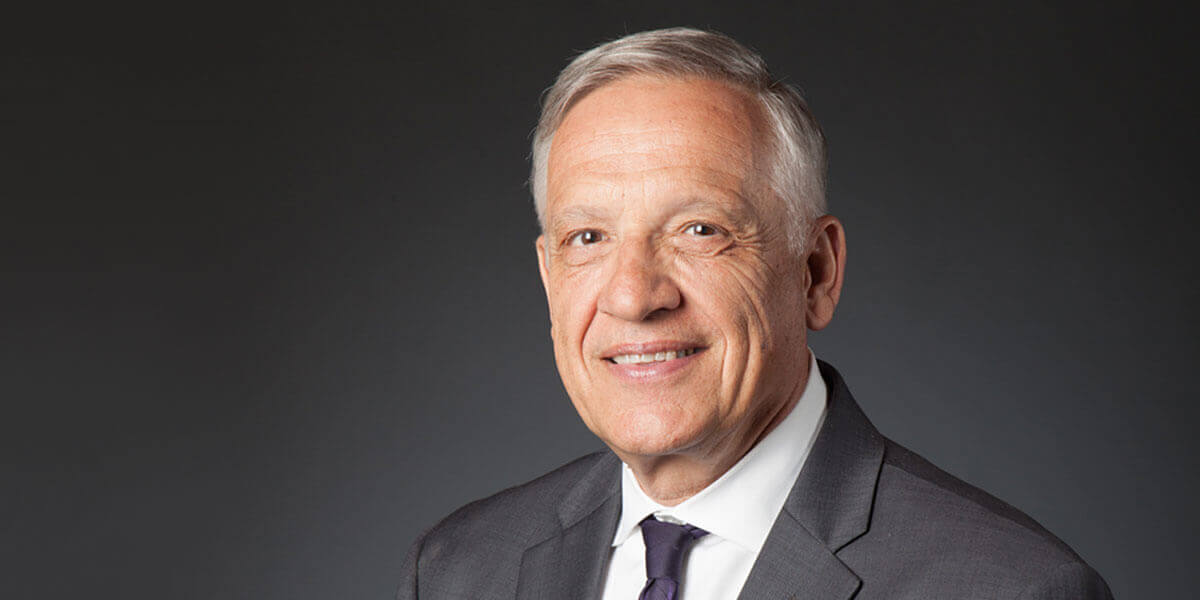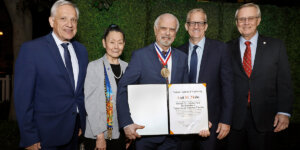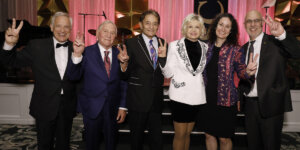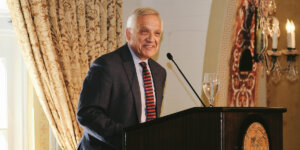
Yannis C. Yortsos (Photo/USC Viterbi)
Yannis C. Yortsos, dean of the USC Viterbi School of Engineering and a pioneer in “changing the conversation about engineering,” has won, along with three collaborators, the NAE’s prestigious Bernard M. Gordon Prize.
Awarded annually by the National Academy of Engineering, the Gordon Prize recognizes academic leaders in engineering for the development of innovative approaches to education. Yortsos becomes the first USC faculty member to receive the accolade.
This year’s Gordon Prize was awarded to recognize the creation and subsequent growth of the Grand Challenges Scholars Program (GCSP). Co-founded in 2009 by USC, Duke University and Olin College, the program has now expanded to more than 100 universities nationwide. The GCSP, Yortsos said, encourages the development of five mindsets among participating undergraduate engineering students, namely undergraduate research, interdisciplinary collaboration, innovation and entrepreneurship, cultural and global understanding, and societal impact and relevance.
“The Grand Challenges Scholars Program essentially redefines engineering education and the engineer of today, because it helps students understand that they have the ability to solve Grand Challenge-like problems in multiple areas” Yortsos said. “The program does not only emphasize the technical part of engineering, but also the fact that the solution of important societal problems requires them to be multidisciplinary, innovative and entrepreneurial, with deep understanding of cultural issues and with distinct appreciation of the societal impact of technology.”
The honor carries a $500,000 cash prize, to be awarded to the GCSP and shared among this year’s four awardees.
At the heart of the Grand Challenges Scholars Program is the development and adoption of a personalized co-curriculum experience based on the NAE’s 14 “Grand Challenges for Engineering.” These include securing cyberspace, advancing personalized learning, reverse-engineering the brain, engineering better medicines, advancing health informatics, providing access to clean water, making solar energy economical, managing the nitrogen cycle and engineering the tools for scientific discovery.
USC now graduates about 50 GCSP students annually. To date, 228 Trojans have successfully completed the program.
GCSP history
In 2009, Yannis Yortsos, Tom Katsouleas, then dean of engineering at Duke, and Rick Miller, former president of Olin College, proposed the creation of the Grand Challenges Scholars Program. They did so to help prepare engineers to solve the Grand Challenges that the NAE had enunciated the previous year.
The GCSP “was also intended to serve as a pilot of innovative educational approaches that would eventually become a mainstream educational paradigm for all engineering students,” Yortsos said.
Since the program’s founding, GCSP students have given research presentations, competed in business model contests or otherwise participated in subsequent Grand Challenges and Global Grand Challenges summits.
In March 2015, President Barack Obama was presented with a letter of commitment, signed by 122 universities and colleges, pledging to educate a new generation of engineers in the Grand Challenges, following the GCSP, with a goal of 20,000 students by 2025.
Katsouleas, now an engineering professor at the University of Connecticut and former UConn president, Miller, Olin’s president emeritus, and Jenna Carpenter, the founding dean of the Engineering School at Campbell University in North Carolina, share the Gordon Prize with Yortsos. Both Katsouleas and Miller served as associate deans at USC Viterbi early in their careers. For several years, Carpenter advised colleges interested in joining the Grand Challenges Scholars Program.
Trustworthy Engineers
What is the future of the GCSP? As the world continues to change exponentially and at an ever-accelerating pace, the Grand Challenges Scholars Program must evolve and adapt to better position tomorrow’s engineers, Yortsos said.
Toward that end, USC Viterbi’s dean has launched a new initiative for the reimagining of the school’s Engineering Writing Program. The Engineering in Society Program, which emphasizes technology ethics, community service and communication, will help add new elements to the Grand Challenges Scholars Programs around the country.
“We should be preparing students not only with outstanding technical competence, which we already are, but also with character, both of which together spell trust,” Yortsos said. “USC Viterbi aspires to create such a model engineering education to produce trustworthy engineers. This vision fits perfectly with the evolution of the GCSP in today’s world of extraordinary accelerating technology and its impact on humanity and society. Indeed, engineers will be called to solve new grand challenges, many with human-centric component.”
Published on January 6th, 2022
Last updated on January 26th, 2022










